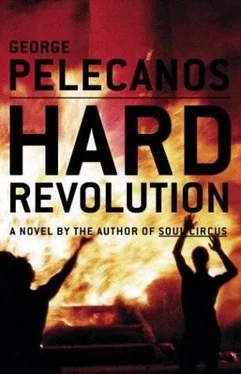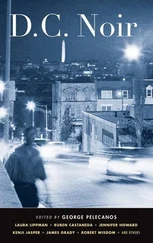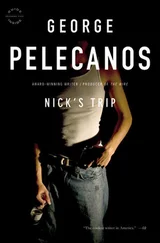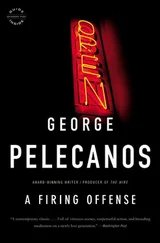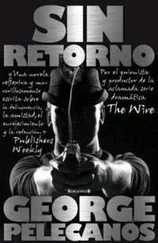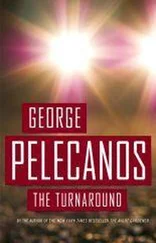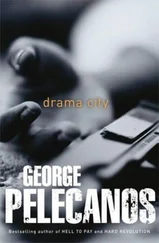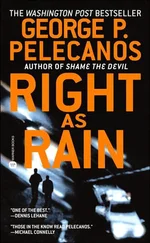According to his information, Walter Hess lived with his parents in a baby blue bungalow with white trim and a broad front porch, located at the crest of a hill. Vaughn found Hess’s mother at home. He told her that he and Shorty had worked together at the machine shop on Brookeville Road before he’d moved on, and that he was just dropping in on his old bud on the long shot that he might be in.
“He’s at work,” said the woman, who was not old but had whiskers sprouting from her chin. She hung back in the doorway and did not step out into the natural light or ask him in. The house smelled of cabbage and dog. There was dog hair swirled upon her embroidered apron. Her eyes were close set. She breathed through her mouth and looked slightly retarded. She was no taller than a child.
“I shoulda known,” said Vaughn. “That Galaxie of his ain’t around.”
“It’s in the shop. He’s drivin’ our Rambler.”
“Oh, yeah, he mentioned once that you all had one. That old blue one, right?”
“Green. You want me to tell him you stopped by?”
“I think I’ll surprise him at the shop,” said Vaughn. “Thank you, ma’am.”
Vaughn drove over to Mississippi Avenue, looking for Buzz Stewart’s house, looking for his Belvedere. But it was not parked along the curb or in the open freestanding garage, which he could see from the street. He didn’t want to talk to Stewart’s people even if they were in. He had already risked too much with Hess’s mother.
Vaughn went out to Brookeville Road, a few miles away, to an industrial area near Montgomery Hills, not far from his own house. He found the machine shop, did not see a green Rambler in the vicinity, and parked nearby. Shortly thereafter a man in a blue work shirt with his name stitched on the breast patch walked out of the shop and lit a cigarette. Vaughn rolled down the window of his Polara and shouted to the man.
“Hey, fella, you seen my buddy Shorty? We supposed to meet here on his break.” Vaughn doing his idea of redneck, which was not much of a stretch.
“His whole life’s a break,” said the man, dragging hungrily on his cigarette.
“Where’s he at, then?” said Vaughn.
“Called in sick,” said the man, flicking ash at his work boots. “Must have that Irish flu.”
Vaughn rolled his window up, turned the key in his Dodge, and took off up the road. So neither Hess nor Stewart was at work. Maybe they got so shitfaced the night before they couldn’t work. But Hess had told his mother he was going to work. Maybe what it was, Hess and Stewart had anticipated the heat and left town. Vaughn didn’t think the little grease monkey would leave D.C. without his Galaxie. But he couldn’t be sure.
He drove to a phone booth outside a body shop. He phoned the station to see if there had been any flags on the bulletin. The desk sergeant told him there was nothing to report. He had received only one message, from a cop named Derek Strange. Strange had asked that Vaughn give him a call.
“Gimme the number where he’s at,” said Vaughn. He pulled his notebook and pen from his jacket, and wrote the number down.
STRANGE SAT IN the living room of an Otis Place apartment, talking with James Hayes. Hayes had gone out for his morning walk, on which he regularly picked up a Post and a pack of smokes. The newspaper sat in a heap at the foot of his chair, and a cigarette burned in an ashtray beside him. Hayes wore a velvet jacket. He had changed out of his street shoes and now wore soft leather slippers. He held a cloth handkerchief, which he used to wipe at his runny nose.
“He left out of here when?” said Strange.
“I’m not sure,” said Hayes. “Maybe ’round eleven o’clock. I had a woman friend coming over here. She works late on Sunday nights.”
“Eleven would fit,” said Strange.
“I had to put him out,” said Hayes. “We were having a good time, just sitting here, listening to some old records and discussin’ things. But he had to go.”
“Ya’ll were gettin’ high?”
“Sure.”
“Was he lucid?”
“He was a little down on reds. And we had drunk some Margeaux and burned a little smoke. I can’t speak for his head. Far as his feet went, though, he wasn’t gone. I wouldn’t have let him out the door had he been stumblin’.”
“What about his mental state?”
“Good,” said Hayes. “He seemed good to me.”
“He didn’t indicate that he was in danger, anything like that?”
“No.”
“The two of you made a transaction, didn’t you, on Sunday night?”
Hayes dragged on his cigarette, released two streams of smoke through his nose. He squinted at Strange through the smoke. “That’s right. He had delivered a little somethin’ to a couple of friends of his.”
The phone rang on the stand by the front door. Hayes got up and answered it, then said, “He’s right here.” He held the phone out to Strange, who crossed the room and grabbed the receiver.
“Derek Strange.”
“This is Vaughn.”
“Thanks for returning my call.”
“What can I do for you?”
“You said you’d help.”
“Talk to me.”
“I’m out here, seein’ what I can piece together.”
“About your brother’s murder.”
“I decided to go around Dolittle,” said Strange.
“I don’t blame you.”
“There’s two men I need to talk to. Alvin Jones and Kenneth Willis. They -”
“Slow up. I’m writing this down.”
“Alvin Jones… Kenneth Willis.”
“Okay.”
“Willis and Jones were planning to rob a corner market down in LeDroit Park. My brother tipped off the man at the market about the robbery. This man called the police. The police picked up Willis on a gun charge before they had a chance to pull it off.”
“What police?” said Vaughn.
“Ninth Precinct,” said Strange.
“Who knows what your brother did?”
“The man he told,” said Strange, fish-eyeing Hayes. “Other than him, you and me.”
“Willis is in custody now?”
“Last I heard.”
“I know some people in the Ninth. What about the other one?”
“Jones is in the wind. I’m having a little trouble locating him.”
“You gonna be there a minute?”
“Yeah.”
“I’ll call you back.”
Strange hung up the phone. He stayed where he was and looked at James Hayes.
“You hear all that?”
“Maybe I did and maybe I didn’t,” said Hayes. “You tell me.”
“Those names sound familiar to you?”
“No.”
“You said that Dennis had sold a little somethin’ for you on Sunday night. Did he sell it to Jones and Willis?”
“He could have,” said Hayes. “But neither of those names is on the check.”
“Say what?”
“Look in that basket right there in front of you,” said Hayes. “Should be a check lyin’ in there. I been too sick to cash it. Takes enough out of me just to walk to Meyer’s for my newspaper and cigarettes.”
Strange read the name off the top of the check and scanned the address. “Dennis gave you this?”
Hayes nodded. “That’s how he paid for the gage.”
The phone rang. Strange picked it up.
“Strange here.”
“I spoke to Jim Mahaffie down in the Ninth. Bad news on Willis.”
“What is it?”
“He got bounced. They arraigned him on the gun charge, but they couldn’t hold him; Willis had soft priors. The attorney they assigned him got him off on a bond.”
“When?”
“This morning.”
“Damn.”
“Look at it like this: You can talk to him alone now, you want to, in your own way.”
“Right.”
“You know where he stays?”
“Somewhere on H.”
“I got his permanent right here,” said Vaughn. He gave Strange the address.
Читать дальше
